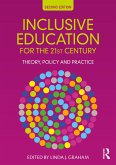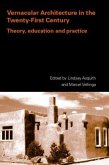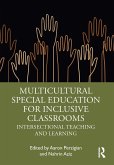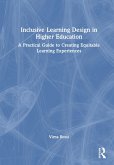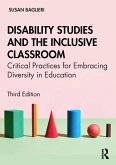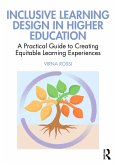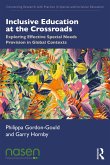- Broschiertes Buch
- Merkliste
- Auf die Merkliste
- Bewerten Bewerten
- Teilen
- Produkt teilen
- Produkterinnerung
- Produkterinnerung
An introduction to the foundational principles and evidence-based classroom strategies for effective inclusive education in both primary and secondary schools.
Andere Kunden interessierten sich auch für
![Inclusive Education for the 21st Century Inclusive Education for the 21st Century]() Inclusive Education for the 21st Century41,99 €
Inclusive Education for the 21st Century41,99 €![Vernacular Architecture in the 21st Century Vernacular Architecture in the 21st Century]() Lindsay Asquith / Marcel Vellinga (eds.)Vernacular Architecture in the 21st Century53,99 €
Lindsay Asquith / Marcel Vellinga (eds.)Vernacular Architecture in the 21st Century53,99 €![Multicultural Special Education for Inclusive Classrooms Multicultural Special Education for Inclusive Classrooms]() Multicultural Special Education for Inclusive Classrooms58,99 €
Multicultural Special Education for Inclusive Classrooms58,99 €![Inclusive Learning Design in Higher Education Inclusive Learning Design in Higher Education]() Virna RossiInclusive Learning Design in Higher Education183,99 €
Virna RossiInclusive Learning Design in Higher Education183,99 €![Disability Studies and the Inclusive Classroom Disability Studies and the Inclusive Classroom]() Susan BaglieriDisability Studies and the Inclusive Classroom55,99 €
Susan BaglieriDisability Studies and the Inclusive Classroom55,99 €![Inclusive Learning Design in Higher Education Inclusive Learning Design in Higher Education]() Virna RossiInclusive Learning Design in Higher Education73,99 €
Virna RossiInclusive Learning Design in Higher Education73,99 €![Inclusive Education at the Crossroads Inclusive Education at the Crossroads]() Philippa Gordon-GouldInclusive Education at the Crossroads32,99 €
Philippa Gordon-GouldInclusive Education at the Crossroads32,99 €-
-
-
An introduction to the foundational principles and evidence-based classroom strategies for effective inclusive education in both primary and secondary schools.
Hinweis: Dieser Artikel kann nur an eine deutsche Lieferadresse ausgeliefert werden.
Hinweis: Dieser Artikel kann nur an eine deutsche Lieferadresse ausgeliefert werden.
Produktdetails
- Produktdetails
- Verlag: Taylor & Francis
- Seitenzahl: 432
- Erscheinungstermin: 3. Dezember 2019
- Englisch
- Abmessung: 228mm x 158mm x 27mm
- Gewicht: 674g
- ISBN-13: 9781760527099
- ISBN-10: 1760527092
- Artikelnr.: 60373138
- Herstellerkennzeichnung
- Libri GmbH
- Europaallee 1
- 36244 Bad Hersfeld
- gpsr@libri.de
- Verlag: Taylor & Francis
- Seitenzahl: 432
- Erscheinungstermin: 3. Dezember 2019
- Englisch
- Abmessung: 228mm x 158mm x 27mm
- Gewicht: 674g
- ISBN-13: 9781760527099
- ISBN-10: 1760527092
- Artikelnr.: 60373138
- Herstellerkennzeichnung
- Libri GmbH
- Europaallee 1
- 36244 Bad Hersfeld
- gpsr@libri.de
Linda J. Graham is a Professor in the School of Early Childhood and Inclusive Education at the Queensland University of Technology. She is the Chair of the Academic Advisory Panel for All Means All: Australian Alliance for Inclusive Education and has published widely on inclusive education.
Part I: Introduction and Fundamental Concepts
1 Inclusive education in the 21st century
2 Fundamental concepts of inclusive education
3 Does inclusion work?
Part II : Educators' Obligations under International and National
Legislation and Policy
4 Inclusive education as a human right
5 Legislation, litigation and implications for inclusion
6 What is the NCCD and what does it mean for my practice?
Part III : Universal Evidence-based Strategies to Effectively Teach Diverse
Learners in Supportive and Safe Inclusive Environments
7 Using assessment data to support student learning
8 Universal approaches to curriculum, pedagogy and assessment
9 Making adjustments to curriculum, pedagogy and assessment
Part IV : Developing Inclusive School Cultures through Inclusive and
Ethical Practices
10 Developing inclusive school cultures through ethical practices
11 Putting students at the centre
12 Nurturing close student-teacher relationships
13 Promoting student wellbeing and mental health through social and
emotional learning
14 Developing productive partnerships with parents and carers
15 Collaborating with colleagues and other professionals
16 Rethinking the use of teacher aides
Index
1 Inclusive education in the 21st century
2 Fundamental concepts of inclusive education
3 Does inclusion work?
Part II : Educators' Obligations under International and National
Legislation and Policy
4 Inclusive education as a human right
5 Legislation, litigation and implications for inclusion
6 What is the NCCD and what does it mean for my practice?
Part III : Universal Evidence-based Strategies to Effectively Teach Diverse
Learners in Supportive and Safe Inclusive Environments
7 Using assessment data to support student learning
8 Universal approaches to curriculum, pedagogy and assessment
9 Making adjustments to curriculum, pedagogy and assessment
Part IV : Developing Inclusive School Cultures through Inclusive and
Ethical Practices
10 Developing inclusive school cultures through ethical practices
11 Putting students at the centre
12 Nurturing close student-teacher relationships
13 Promoting student wellbeing and mental health through social and
emotional learning
14 Developing productive partnerships with parents and carers
15 Collaborating with colleagues and other professionals
16 Rethinking the use of teacher aides
Index
Part I: Introduction and Fundamental Concepts
1 Inclusive education in the 21st century
2 Fundamental concepts of inclusive education
3 Does inclusion work?
Part II : Educators' Obligations under International and National
Legislation and Policy
4 Inclusive education as a human right
5 Legislation, litigation and implications for inclusion
6 What is the NCCD and what does it mean for my practice?
Part III : Universal Evidence-based Strategies to Effectively Teach Diverse
Learners in Supportive and Safe Inclusive Environments
7 Using assessment data to support student learning
8 Universal approaches to curriculum, pedagogy and assessment
9 Making adjustments to curriculum, pedagogy and assessment
Part IV : Developing Inclusive School Cultures through Inclusive and
Ethical Practices
10 Developing inclusive school cultures through ethical practices
11 Putting students at the centre
12 Nurturing close student-teacher relationships
13 Promoting student wellbeing and mental health through social and
emotional learning
14 Developing productive partnerships with parents and carers
15 Collaborating with colleagues and other professionals
16 Rethinking the use of teacher aides
Index
1 Inclusive education in the 21st century
2 Fundamental concepts of inclusive education
3 Does inclusion work?
Part II : Educators' Obligations under International and National
Legislation and Policy
4 Inclusive education as a human right
5 Legislation, litigation and implications for inclusion
6 What is the NCCD and what does it mean for my practice?
Part III : Universal Evidence-based Strategies to Effectively Teach Diverse
Learners in Supportive and Safe Inclusive Environments
7 Using assessment data to support student learning
8 Universal approaches to curriculum, pedagogy and assessment
9 Making adjustments to curriculum, pedagogy and assessment
Part IV : Developing Inclusive School Cultures through Inclusive and
Ethical Practices
10 Developing inclusive school cultures through ethical practices
11 Putting students at the centre
12 Nurturing close student-teacher relationships
13 Promoting student wellbeing and mental health through social and
emotional learning
14 Developing productive partnerships with parents and carers
15 Collaborating with colleagues and other professionals
16 Rethinking the use of teacher aides
Index


